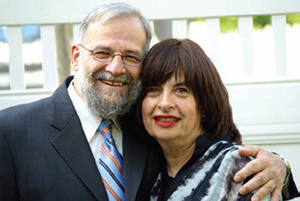
“If you do not know the correct way to go, steer to the right.”
For many years before the days of Waze, I would use that adage and hope for the best. Today, none of us have to be concerned about the direction to take while driving. Either with a GPS, Google Maps or WAZE, we are all usually on our way to get where we have to go.
Yet, I still apply this adage to my life frequently. There are times when I am not sure which direction I should take with regard to a decision that needs to be made. Frequently when a person passes away a decision has to be made whether or not to visit the shiva home. The uncertainty generally is only in the cases of people that you hardly knew or family members that you have never met. For us in particular, in a community where we have many more acquaintances than friends, we are left with this gnawing feeling of at which point we should or should not go to a shiva home. Is it an intrusion for the people sitting shiva to have virtual strangers come to their home? Is it welcomed? The most puzzling is when people indicate “private shiva” in an obituary and then later on word spreads about the number of people that did not visit. Who and what does “private shiva” apply to?
Despite the fact that the halacha specifically states that one should not address the “ovel” until he addresses the visitor first, we have been to shiva homes where there is conversation going back and forth between the mourner and the visitors while we sit awkwardly quiet. As observers rather than participants in the discussion we wonder if we should have been there?
Is it appropriate for the public in general to visit the home of a young chayal who is murdered by terrorists as he is hitchhiking? Is this an intrusion on his family’s privacy? Shortly after a young high school graduate from Sharon, Massachusetts was murdered while doing an act of chesed delivering food to soldiers near Gush Etzion, his parents shiva home in Massachusetts became a mecca to which people travelled from everywhere to extend their sympathies. No question the intentions were overwhelmingly positive. I remember questioning in my mind just how much voyeurism is attached to these visits. Do people actually appreciate the visits of total strangers lining up in front of their home in their quiet neighborhood to offer their condolences?
Just yesterday I decided to take the plunge and found myself face to face with this issue. I noticed a post from Rabbi Ari Zahtz of Congregation Bnai Yeshurun inviting people to join him in visiting the Ferencz family sitting shiva in Jersey City. We all have read and witnessed on TV the torturous event which took place last week in Jersey City in which Mindy Ferencz z”l, wife, mother and sister was murdered at the hands of two maniacal individuals, along with three other innocent victims. So there it was, an opportunity to visit a stranger’s shiva home and do what I have always questioned was the right thing. I said to myself that it was time to go with it—steer to the “right.”
Approximately twenty people congregated at Bnai Yeshurun and divvied into small groups with the intention of driving to the Ferencz home. We arrived at the open door of the home and walked directly up two extremely steep flights of stairs. We were ushered into the room where Mindy’s eight sisters were sitting shiva. The room was tiny and the amount of space was limited. We were offered seats by two ladies that rose in order for us to be able to sit. I looked into the eyes of one of the women sitting shiva and she asked me where we were from. I explained that we were from Teaneck and that we needed to be there in solidarity to let them know that we have all been touched by this tragedy. They told us that they were 11 children, nine sisters and two brothers. We all agreed that the reality of life will set in next week when the shiva is over and life takes over. How that can happen only Hashem knows. They thanked us for coming and after at most ten minutes we left.
I still struggle to understand if it was meaningful to them that we came. I would like to think yes. The need to share with them how much we cared was as important for us to say as it was for them to hear. One of the feelings that I have about this experience is that people are coming to visit from communities that have little if anything to do with Chassidim. I hope from this they can learn that Chassidim are not to be gawked at, but are our brothers and sisters just as our friends and neighbors are. As far as I am concerned there is too much finger pointing in our Jewish world of “them” and “us.” We are all one. The store in Jersey City was attacked not because of the type of Jews working there but because they were Jews. Exactly the same as Jews just like us shopping in and managing one of the many establishments in our community.
I sincerely hope that our visit helped ease the family’s great burden of grief, at least for a few minutes. Rabbi Zahtz, you are to be commended for initiating this endeavor. From the comments of the participants, everyone gained a great deal from this visit. Both the visitors and the visited family will always remember the achdut which was achieved in a very short time.
By Nina Glick










